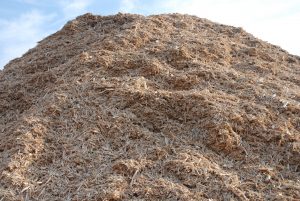 The European Commission plans to delay its anti-deforestation rules again—citing the need to reduce red tape. In other Forestry news: the USDA’s Roadless Rule outreach garnered a massive response; WWF-Canada’s Living Planet Report says over half of species are in decline; Vancouver Island mayors and MP Gunn say BC forestry is in crisis; Apple launches project to protect California redwoods; the US Forest Service reflects on Hurricane Helene recovery; and the unexpected upside of Canada’s wildfires.
The European Commission plans to delay its anti-deforestation rules again—citing the need to reduce red tape. In other Forestry news: the USDA’s Roadless Rule outreach garnered a massive response; WWF-Canada’s Living Planet Report says over half of species are in decline; Vancouver Island mayors and MP Gunn say BC forestry is in crisis; Apple launches project to protect California redwoods; the US Forest Service reflects on Hurricane Helene recovery; and the unexpected upside of Canada’s wildfires.
In Company news: Western Forest Products will curtail ~50 million board feet in BC, Interfor secures $5M to upgrade its Sault Ste. Marie mill, Acadian Timber invests in digital forestry at University of New Brunswick; Canadian Kraft Paper says First Nations suit in The Pas, Manitoba should be tossed; and a Sustainable Timber Tasmania error resulted in protester charges being dropped. Meanwhile, perspectives on what’s wrong with housing policy in Ontario and the United States.
Finally, FPAC honoured MP Gord Johns and Mayors Spencer Coyne and Crystal McAteer with the 2025 Jim Carr Forest Community Champion Award.
Kelly McCloskey, Tree Frog Editor

.jpg)

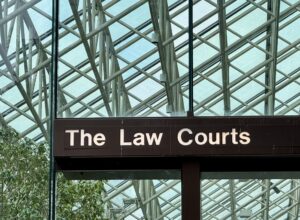
 Western Forest Products announced planned temporary operating curtailments at its BC sawmills during the fourth quarter of 2025. These planned curtailments, combined with temporary curtailments taken in Q3 of 2025, will collectively reduce lumber production by ~50 million board feet in the second half of 2025, amounting to ~6% of the Company’s annual lumber capacity. The curtailments are in response to persistently weak market conditions, further impacted by increases in US lumber duties. In addition, certain factors relating to the operating environment, including a lack of available economic log supply, ongoing harvesting permitting delays and the strike by the United Steelworkers Local 1-1937 at our La-kwa sa muqw Forestry Limited Partnership are also contributing factors. The temporary curtailments will be taken through a combination of reduced operating hours, an extended holiday break and reconfigured shifting schedules. The Chemainus sawmill, which was curtailed for the third quarter of 2025, will remain temporarily curtailed for the fourth quarter.
Western Forest Products announced planned temporary operating curtailments at its BC sawmills during the fourth quarter of 2025. These planned curtailments, combined with temporary curtailments taken in Q3 of 2025, will collectively reduce lumber production by ~50 million board feet in the second half of 2025, amounting to ~6% of the Company’s annual lumber capacity. The curtailments are in response to persistently weak market conditions, further impacted by increases in US lumber duties. In addition, certain factors relating to the operating environment, including a lack of available economic log supply, ongoing harvesting permitting delays and the strike by the United Steelworkers Local 1-1937 at our La-kwa sa muqw Forestry Limited Partnership are also contributing factors. The temporary curtailments will be taken through a combination of reduced operating hours, an extended holiday break and reconfigured shifting schedules. The Chemainus sawmill, which was curtailed for the third quarter of 2025, will remain temporarily curtailed for the fourth quarter.  Ontario’s Associate Minister of Forestry and Forest Products announced over $5 million in funding today for Interfor Sault Ste. Marie at the company’s mill on Peoples Road.
Ontario’s Associate Minister of Forestry and Forest Products announced over $5 million in funding today for Interfor Sault Ste. Marie at the company’s mill on Peoples Road. 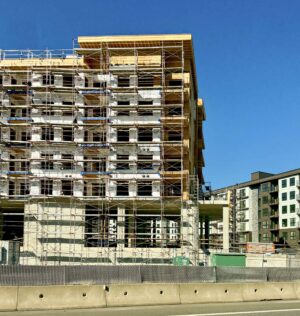 Housing starts and pre-sales in much of Southern Ontario have earned failing grades and are on track to get even worse, a new study warns — a situation that “should alarm policymakers across all three orders of government.” The report from University of Ottawa’s Missing Middle Initiative compares housing starts and sales in 34 municipalities across the Greater Toronto Area and neighbouring Southern Ontario cities for the first six months of 2025 with the same period from 2021–2024. It found starts are down 40% relative to that four-year average, with pre-construction condo sales plunging 89 per cent and other homes 70 per cent. The reduction in starts has direct employment implications, and the collapse in pre-construction sales, the study says, is “a clear indication that Ontario’s housing situation will get worse before it gets better, and that market weakness is not isolated to the condo market.” …The study paints a similarly bleak picture for the first half of 2025.
Housing starts and pre-sales in much of Southern Ontario have earned failing grades and are on track to get even worse, a new study warns — a situation that “should alarm policymakers across all three orders of government.” The report from University of Ottawa’s Missing Middle Initiative compares housing starts and sales in 34 municipalities across the Greater Toronto Area and neighbouring Southern Ontario cities for the first six months of 2025 with the same period from 2021–2024. It found starts are down 40% relative to that four-year average, with pre-construction condo sales plunging 89 per cent and other homes 70 per cent. The reduction in starts has direct employment implications, and the collapse in pre-construction sales, the study says, is “a clear indication that Ontario’s housing situation will get worse before it gets better, and that market weakness is not isolated to the condo market.” …The study paints a similarly bleak picture for the first half of 2025.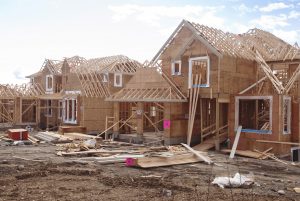 Housing is the foundation of the economy. …It’s not a surprise, then, that the Trump administration recently said it was considering declaring the housing crisis a national emergency. The federal government alone can’t solve the housing crisis. That said, the administration could take steps that would meaningfully help make American housing more affordable. …One of the biggest issues is supply. …But
Housing is the foundation of the economy. …It’s not a surprise, then, that the Trump administration recently said it was considering declaring the housing crisis a national emergency. The federal government alone can’t solve the housing crisis. That said, the administration could take steps that would meaningfully help make American housing more affordable. …One of the biggest issues is supply. …But 
 TORONTO — World Wildlife Fund Canada’s
TORONTO — World Wildlife Fund Canada’s  Mosaic Forest Management says it has heard Vancouver Islanders loud and clear when it comes to accessing private forest lands,
Mosaic Forest Management says it has heard Vancouver Islanders loud and clear when it comes to accessing private forest lands, 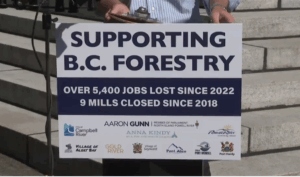 Today on the back steps of the Legislature building, MP Aaron Gunn, MLA Anna Kindy along with five North Island Mayors are calling on Ottawa and BC to remove the red tape when it comes to cutting permits in the province. North Island- Powell River MP Aaron Gunn sent an open letter today to both Premier David Eby and Prime Minister Mark Carney telling North Vancouver Island and the province is in a forestry crisis. “Harvest volumes have collapsed in half and more than 5,400 jobs have been lost. It’s the result of made in BC, made in Canada policies that have delayed permitting, dramatically increased harvesting costs and crippled investors confidence,” said Gunn. The Mayor of Powell River Ron Woznow was at the press conference with Gunn, echoing his concerns. …BC Forests Minister Ravi Parmar reacted briefly… adding that more details on a ‘refreshed BC timber sales’ will be released Tuesday.
Today on the back steps of the Legislature building, MP Aaron Gunn, MLA Anna Kindy along with five North Island Mayors are calling on Ottawa and BC to remove the red tape when it comes to cutting permits in the province. North Island- Powell River MP Aaron Gunn sent an open letter today to both Premier David Eby and Prime Minister Mark Carney telling North Vancouver Island and the province is in a forestry crisis. “Harvest volumes have collapsed in half and more than 5,400 jobs have been lost. It’s the result of made in BC, made in Canada policies that have delayed permitting, dramatically increased harvesting costs and crippled investors confidence,” said Gunn. The Mayor of Powell River Ron Woznow was at the press conference with Gunn, echoing his concerns. …BC Forests Minister Ravi Parmar reacted briefly… adding that more details on a ‘refreshed BC timber sales’ will be released Tuesday.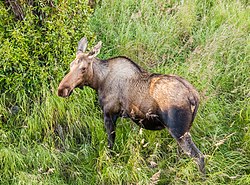

 Only a month after the twentieth anniversary of Hurricane Katrina, another anniversary comes due for a different catastrophic storm—it is the first anniversary after Hurricane Helene devastated the communities of the Southern Appalachians. On September 26, 2024, Hurricane Helene made landfall in southwestern Florida as a Category 4 hurricane with a peak sustained windspeed of 140 mph. After inundating Florida with storm surge, Helene swept north into Georgia and then the Carolinas, before stalling over Tennessee, Kentucky and Virginia and eventually dissipating. However, it brought both tornado-strength winds and a deluge of rainfall that triggered flooding throughout the mountains and valleys of the Southeast. The hurricane was one of the deadliest and most destructive on record, causing more than 250 deaths and just under $80 billion in damage. Helene cut a path over nine national forests from Florida to Kentucky. The forests and the USDA Forest Service employees that manage them were right in the path of destruction.
Only a month after the twentieth anniversary of Hurricane Katrina, another anniversary comes due for a different catastrophic storm—it is the first anniversary after Hurricane Helene devastated the communities of the Southern Appalachians. On September 26, 2024, Hurricane Helene made landfall in southwestern Florida as a Category 4 hurricane with a peak sustained windspeed of 140 mph. After inundating Florida with storm surge, Helene swept north into Georgia and then the Carolinas, before stalling over Tennessee, Kentucky and Virginia and eventually dissipating. However, it brought both tornado-strength winds and a deluge of rainfall that triggered flooding throughout the mountains and valleys of the Southeast. The hurricane was one of the deadliest and most destructive on record, causing more than 250 deaths and just under $80 billion in damage. Helene cut a path over nine national forests from Florida to Kentucky. The forests and the USDA Forest Service employees that manage them were right in the path of destruction.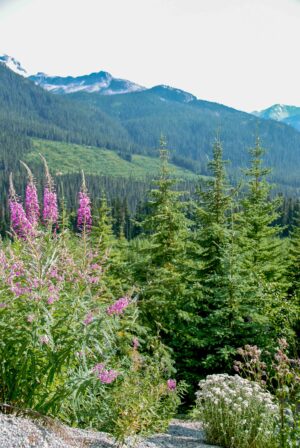

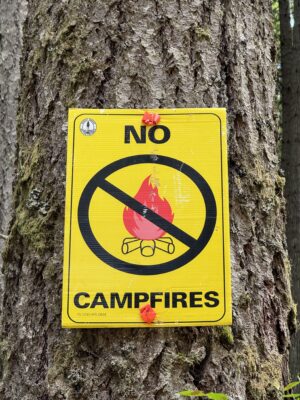
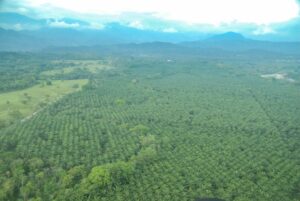 The European Commission has proposed delaying the EU’s flagship anti-deforestation law for the second year in a row as it continues its war on red tape. The rules, which would force companies to stop using commodities that have been produced on deforested land, are unpopular with many businesses who argue they impose complex regulatory burdens. Several of the EU’s trading partners have also complained about the law. …The EU’s environment commissioner Jessika Roswall, announcing the delay of the European Union Deforestation Regulation said “We need the time to combat the risk with the load of information in the IT system.” …It’s the latest in a long string of actions by the Commission since late last year to weaken or delay green rules, part of a grand push to get rid of red tape and boost the global competitiveness of European industry.
The European Commission has proposed delaying the EU’s flagship anti-deforestation law for the second year in a row as it continues its war on red tape. The rules, which would force companies to stop using commodities that have been produced on deforested land, are unpopular with many businesses who argue they impose complex regulatory burdens. Several of the EU’s trading partners have also complained about the law. …The EU’s environment commissioner Jessika Roswall, announcing the delay of the European Union Deforestation Regulation said “We need the time to combat the risk with the load of information in the IT system.” …It’s the latest in a long string of actions by the Commission since late last year to weaken or delay green rules, part of a grand push to get rid of red tape and boost the global competitiveness of European industry. 

